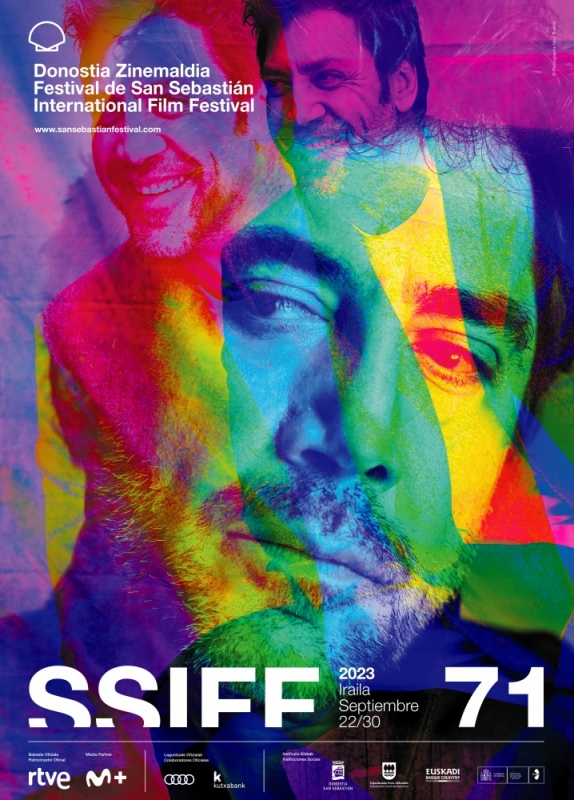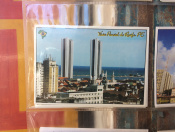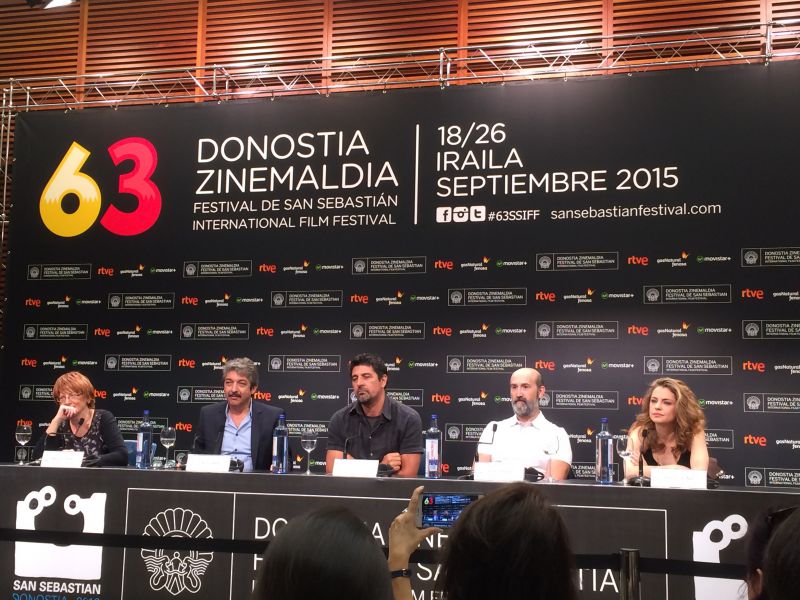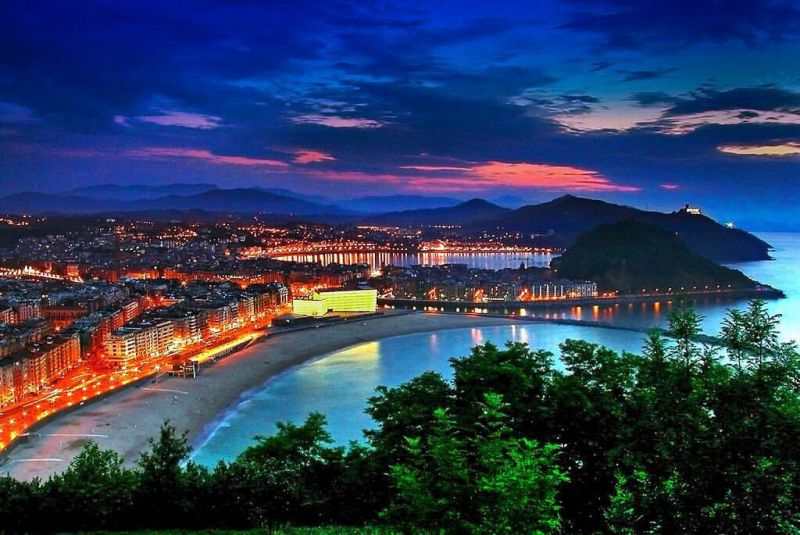Pro Tools
FILMFESTIVALS | 24/7 world wide coverage
Welcome !
Enjoy the best of both worlds: Film & Festival News, exploring the best of the film festivals community.
Launched in 1995, relentlessly connecting films to festivals, documenting and promoting festivals worldwide.
Sorry for the disruptions we are working on the platform as of today.
For collaboration, editorial contributions, or publicity, please send us an email here.
|
Home >> Blogs >> SanSebastian's blog >> The five filmmakers from the Ikusmira Berriak programme's fourth edition began their six-week residencies this week The five filmmakers from the Ikusmira Berriak programme's fourth edition began their six-week residencies this week
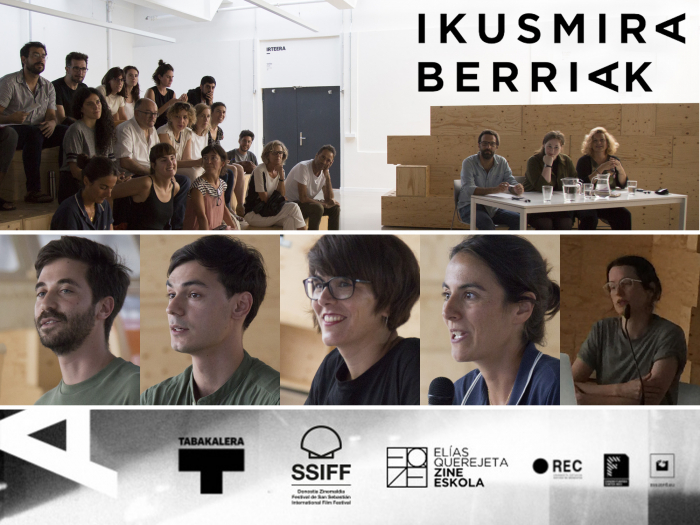
''The context of Ikusmira Berriak is ideal for concentrating on a single project''
The fourth edition of Ikusmira Berriak began last Monday, August 20th. During the six weeks that the residencies last, the five filmmakers chosen from the 155 proposals received Manuel Abramovich, Nele Wohlatz, Elena López Riera, Arantza Santesteban and Grigory Kolomytsev, will undertake their projects at the Tabakalera Artist's Space.
Also travelling to San Sebastián to accompany them throughout this process was the panel of experts made up of the Irish producer Fodhla Cronin O'Reilly, the Brazilian filmmaker Sergio Oksman, and the director of TorinoFilmLab, Savina Neirotti, individuals who have also attended the residents' pitch sessions. The Romanian maker Constantin Popescu will give residents a talk next week. Popescu competed last year in the Official Selection with Pororoca (Golden Shell for the best actor as a result of Bogdan Dumitrache's work). The third week of the residency, filmmakers Tizza Covi and Rainer Frimmel –founders of Vento Films– will share their documentary cinema knowledge and experience with the residents.
During the fourth week, residents will visit the facilities at REC Grabaketa Estudioa, and they'll have time to work individually on their projects. During the fifth week, they'll prepare their presentations for the industry, with said presentations will being made on Sunday the 23rd as part of the Europe-Latin America Co-Production Forum at the Festival. Residents will also have a meeting with the students of Elías Querejeta Film School.
During their final week, residents will have their own space at the San Telmo Museum –seat of the Co-Production Forum– to undertake their one-to-one meetings with the accredited professionals who show interest in their projects. Additionally, they'll be able to participate in the rest of the industry activities and attend Festival screenings.
During the press conference for the film industry awards ceremony, to be held on Wednesday, September 26, the winner of the fourth annual edition will be made known. In addition to the financial support of 25,000 euros provided by the programme and distributed amongst the chosen projects, REC Grabaketa Estudioa is offering, as an award, its feature film post-production services – a value of 35,000 euros.
Three projects selected from previous editions of Ikusmira Berriak have been finished and screened at the Festival: the short films El extraño by Pablo Álvarez, Calipatria by Leo Calice and Gerhard Treml, and Gwendolyn Green by Tamyka Smith were presented at Zabaltegi-Tabakalera in 2016 and 2017. This year, the programme's first finished feature film made its debut in Locarno: Trote, directed by Xacio Baño, a resident during the first edition whose film will also be shown at Zabaltegi-Tabakalera.
This fourth annual edition will be the last one under Ikusmira Berriak's current structure. The next edition will be divided into two stays: one in February and one in September. The call for the fifth edition, which will be held in accordance with the new model, will close on the 31st. In October, the five selected projects will be unveiled.
We asked the five filmmakers about why they presented their projects for the Ikusmira Berriak programme and the expectations they have for the experience.

-
Why did you decide to apply for a residency through Ikusmira Berriak?
I consider Ikusmira Berriak to be the ideal context for the conceptual development and writing work for my new project El Oasis. I remember that last year, when I presented my film Soldado in the Zabaltegi-Tabakalera section of the San Sebastián Festival, I was fascinated by the city: I think that it's magical. I also visited Tabakalera for the first time and I thought it was an incredible place. That's when I said to myself: "It would be amazing to come here to work for more time." A few months later, I found out about the Ikusmira Berriak residencies and I didn't think twice about applying with El Oasis. Last year I was working non-stop on different projects all at once. Sometimes it's hard to find the time and the space to move forward on each one. That's why I really appreciate the opportunity to use these six weeks to finish up my writing of this film, as well as the chance to cooperate and share in the process with other filmmakers and colleagues from the film industry.
-
What are your expectations?
I consider the Ikusmira Berriak residency a chance to work exclusively –with the necessary dedication, time, and resources– on this new project. A long-term stay in which research and creation processes can be shared, points of view can be discussed, and associations can be made within a context of exchange and cooperation with other colleagues who are going through similar processes with their films.

-
Why did you decide to apply for a residency through Ikusmira Berriak?
My first international film festival was the 64 SSIFF. I was very fascinated by it and for the first time I publicly declared - "I am a director". The participation of my graduation student film at the 65 SSIFF gave me confidence and this place became a native, my 'second school'. Therefore, it is a great pleasure for me to participate in the Ikusmira Berriak residence and continue my post-graduation education on the threshold of my debut feature film.
-
What are your expectations?
I am stumped. There are so many different thoughts about my film in my head. Ikusmira Berriak is a great opportunity to leave all the problems and devote these weeks only for project developing. I expect a rustle of thoughts.

-
Why did you decide to apply for a residency through Ikusmira Berriak?
I was already familiar with Tabakalera because of prior cooperative work, and I had also heard other former residents explain that it had been a very satisfying experience. I think that the context is ideal to be able to concentrate on a specific project; I think that it's something very enriching – not only because of having lodging secured, but also because of being able to share the space with other filmmakers and creators.
-
What are your expectations?
I hope to be able to finish up my script first and foremost, but I also hope to be able to share experiences with other professionals. I also find the role of the different experts (filmmakers, programmers, producers) quite stimulating, as said individuals can give us personal advice.

-
Why did you decide to apply for a residency through Ikusmira Berriak?
I applied for the Ikusmira Berriak residency to be able to find the time, space, and resources to develop my film 918 GAU. Making a film is not easy, and the Ikusmira Berriak programme offers a good opportunity to gain good momentum.
-
What are your expectations?
Over these six weeks I hope, above all, to have a space for concentration; I think that for those of us who are here, we need 'retreats' like this one. Without this type of stay, making films is really complicated. Additionally, I'm quite interested in giving and getting feedback on the projects that we're working on here; the tutorials, relations between the directors, the whole Zinemaldi period, etc. I think that everybody's projects will grow a lot these days.

-
Why did you decide to apply for a residency through Ikusmira Berriak?
The residency sounds quite generous: a space and living expenses paid for to be able to concentrate on my work, tutorials, money to continue developing the project. And the length seems great to me: not too short, but also not too long.
-
What are your expectations?
A little push to help me rethink my project and clear up unresolved issues, time to write, exchange with my colleagues, the sea.
PROJECTS
|
|
|
|
|
|
918 Gau (918 Nights)
Arantza Santesteban (Spain)
In the miniscule cell of a police van, a woman who had spent many years in jail told me: to explain what prison is like, you have to have slept there. Almost a decade ago, I spent 918 nights in prison. This film looks at what it is like to live in an isolated world with no images.
|
|
|
|
Director's bio/filmography
A history graduate of the University of the Basque Country. She holds a degree in Creative Documentary from the Centre de Dones Francesca Bonnemaison (2012, Barcelona). Likewise, she has trained in Documentary Film Writing with Carmen Ávalos (2013, Barcelona). She has carried out specific training with Víctor Erice (2015, San Sebastian) and Patricio Guzmán (2016, Madrid). In 2012, she began to work as a director in various documentaries, including the noteworthy Passatgeres, her first work. Together with others, she curated the GORPUTZ_GRAFIAK exhibition at the Koldo Mitxelena cultural centre (San Sebastian) in 2015. This work brings together genealogy and research work from the Basque Country's feminist movement. Together with Irati Gorostidi, she directed Euritan in 2017, which was selected in the 2017 Kimuak catalogue. She has made the rounds at festivals such as San Sebastian, Punto de Vista, Miradas Doc, and the Malaga Film Festival. In 2017, she was selected by the Huarte Centre of Contemporary Art to carry out a curatorial research residency, through which she will curate the Imágenes a través: reflexiones sobre imágenes en conflictos ('Traversing images: reflections on images in conflict') international seminar in June of 2018. She is a researcher of the Communication, culture, society, and politics master's programme (UNED-Spain), and studies questions that relate to cinematographic representation, feminism, and contemporary political conflicts.
Director's note
There are numerous cinematographic narratives about prison, however, in my opinion, they are always missing something. What these images reflect are not daily conditions in prison, but ways in which the popular consciousness about them works. Cells, yards, fences, organised crime, terrorism, and drugs... These are elements that are a part of our prior characterisations. However, it is practically impossible to represent questions that are fundamental to understanding daily life in prison: the passing of time, isolation from the outside world, the physical and psychological consequences of confinement, opaque spaces of domination, etc. This film will address those topics.
|
|
|
|
|
|
|
Chupacabra
Grigory Kolomytsev (Russia)
Nine year-old Andrey lives on the outskirts of a small town near the White Sea. His father has left them and his mother, nervous and tired of being poor, keeps Andrey in constant tension and often beats him. At the slightest sign of bad behaviour, she threatens to put him into an orphanage. One stormy day, Andrey finds a dead dog on the shore and decides that it is the mystical beast known as Chupacabra, a goat vampire, which will help his mother to recover from her health problems and bring his family back together again. Once Andrey had heard on the television that a bite of the Chupacabra on a full moon night would turn its victim into the self-same Chupacabra. He scrapes his hand with the dead dog’s fang.
|
|
|
|
Director's bio/filmography
Grigory Kolomytsev (1990, Russia) graduated from the Russian State University of Cinematography (VGIK) in 2017 (workshop of the Kott brothers). His debut short film Three Sisters (2015) was Semifinalist of the 43d Student Academy Awards. His next short work Mary was shown at more then 60 festivals including San Sebastian, Cairo, Camerimage, ZINEBI, etc. In 2017 he shooted his diploma film I’m Staying on the Black sea shore where he spent his childhood. It was shown at San Sebastian, Premiers Plans - Festival D’Angers, Winterthur etc. Chupacabra will be his debut feature film.
Director's note
For me it is very important to make a debut picture about childhood - the necessary distance has already been passed, but feelings and memories are still hot. I was born near the sea. There was my first death experence. Sound of waves and wind is the sound of my childhood, tears of mother is my main humane feeling.
Andrey, this small autistic boy, sincerely believes that there is no death, that he can find love by sacrificing himself.
This is a film about the ordeal of a little Holy child. It is a "Life of Saint Andrey".
|
|
|
|
|
|
|
Dormen os peixes de olhos abertos? (Do Fish Sleep With Their Eyes Open?)
Nele Wohlatz (Brazil)
Ah, Bo and Lixue wander round a strange tropical metropolis which predicts the future of our cities. A fisherman turned an umbrella salesman, a young girl who refuses to settle, a tourist, the only one in the whole city. A tower of luxury flats with oversized white rooms; shops with cheap things Made in China; a beach with shark attacks; the sea. Three foreigners, the lack of roots and a chronicle which changes hands: who’s talking through who?
|
|
|
|
Director's bio/filmography
Nele Wohlatz (1982, Hannover) studied art and film in Karlsruhe and Buenos Aires. She created the short films La mochila perfecta and Tres oraciones sobre la Argentina, and co-directed Ricardo Bär. The first full-length film she directed on her own was El futuro perfecto, which was shown at more than 60 international festivals and won numerous awards, including such as the Best First Feature award at Locarno.
Director's note
Recife is a city with a great deal of history, yet it seems that urban development is focused on erasing its mark and replacing it with the feeling of an airport: generic towers with private security surrounded by high walls, shopping centres, and urban highways that connect these locations. I want to make a film could take place anywhere, because it is about people that came for different reasons, but do not belong in their new city. After my first visit to Recife I thought, why not here? Behind its anonymous face, the city is full of ruptures, warmth, and peculiarities.
|
|
|
|
|
|
|
El agua (Water)
Elena López Riera (Switzerland)
The threat of a severe storm closes in on a town in South-East Spain. Ana, 17, whose mother mysteriously disappeared in the last flood, has become the subject of stories told by the local women, repeating that there, water is always mixed with death. In this electric atmosphere before the storm, heavy with humidity and death, Ana, who is obsessed with her mother’s ghost, meets José, her first love.
|
|
|
|
Director's bio/filmography
Elena López holds a doctorate in Audiovisual Communication and is a filmmaker. She has directed Pueblo (2015), which debuted at the Director's Fortnight in Cannes, and Las vísceras (2016), which premiered at the Locarno Festival. She is a member of the Lacasinegra collective, through which she co-directed Pas à Genève. She has also worked as a producer for the Seville, Belfort, and Visions du Réel festivals.
Director's note
I was born in Orihuela, a town in the Spanish Levant divided by the Segura, one of Europe's most polluted rivers. I grew up with my mother, my grandmother, and my aunts, surrounded by women that used to tell all kinds of stories to take the ease off the long afternoons of asphyxiating heat. These stories almost always had a true origin (based on events, secrets whispered between neighbours, or family stories), but changed with each new version until some of them became truly fantastic tales. This is surely why I decided, one day, to make films. It was my way of participating in this popular, collective tale that does not distinguish between history and poetry.
|
|
|
|
|
|
|
El oasis
Manuel Abramovich (Mexico - Argentina)
“Why do you want to do porn?” Lalo was asked during the casting. “Because I love feigning pleasure.” Lalo is a little over thirty years of age, but he still lives with his parents. At night he shows himself nude on an Internet page, so that a virtual audience can look at him from all over the world and leave comments. Nobody in his family knows that he’s gay, or that he’s about to appear in his first film as a porn actor. Lalo’s sexuality is always surrounded with an aura of showmanship, as though his pleasure were always for the eyes of the other person. If a porn actor turns his sexuality into a spectacle, where’s the pleasure?
|
|
|
|
Director's bio/filmography
Manuel Abramovich (Buenos Aires, 1987) is a director, producer, and directory of photography.
His work challenges the limits between reality and fiction, and reflects on the concept of an author in so-called 'documentary filmmaking'. He has directed La Reina (2013), Las Luces (2014), Solar (2016), Soldado (2017), and Años Luz (2017). His works have received numerous awards, and have been shown at festivals and artistic institutions such as the Berlinale, Venice, San Sebastian, MoMA, Cinéma du Réel, IDFA, Tribeca, Tabakalera, Film Society of Lincoln Center, BAFICI, and Documenta Madrid.
He was selected for various grants and residencies, including the Fondo Nacional de las Artes (Buenos Aires), Tres Puertos (Mexico and Chile), EMARE (Germany), and others.
Currently, he is developing a trilogy focused on sex work and pornography in three cities: Berlin, Mexico City, and Buenos Aires.
Años Luz, 2017, Argentina/Spain/Brazil, 72'.
Soldado, 2017, Argentina, 73'.
Solar, 2016, Argentina, 75'.
Las Luces, 2014, Argentina, 6'.
La Reina, 2013, Argentina, 19'.
Director's note
El Oasis is a film on the construction of intimacy as a show.
This is also the second piece of a trilogy that I am producing on the male body used as a business, focused on pornography and sex work in three cities (Berlin, Mexico City, and Buenos Aires).
I am interested in the porn industry as a context to talk about sex in a world where the self is constructed by others, where we must be connected to exist and be seen. How does the body itself become a performance? How does pleasure act?
|
|
|

 Barreda de Biurrun Inés
Barreda de Biurrun Inés 


